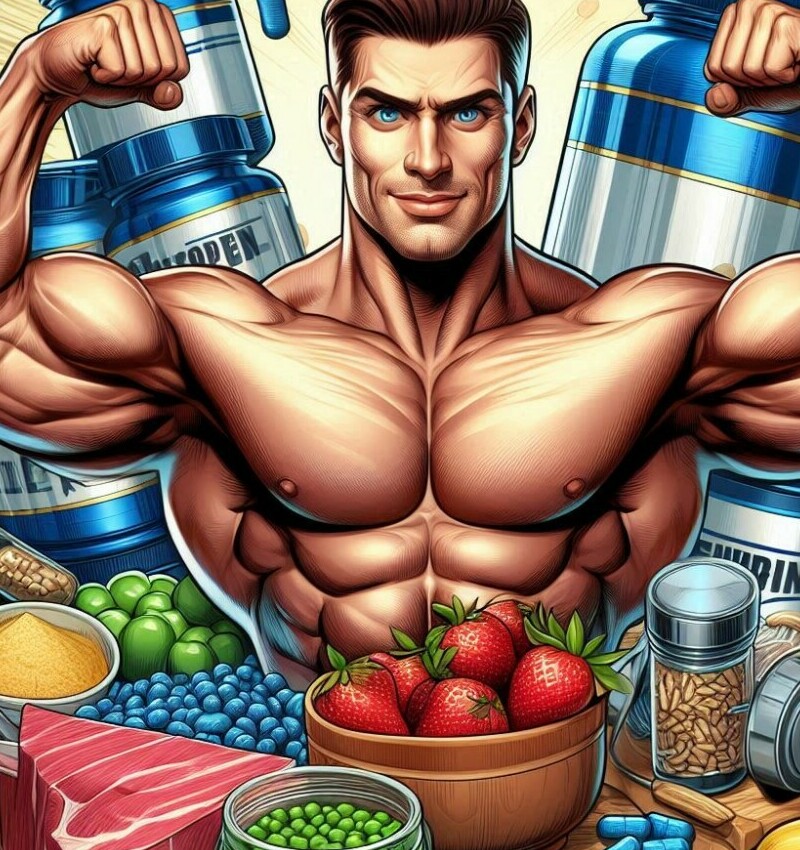
Choosing the right protein supplements can significantly impact muscle building.
Protein serves as the building block of your muscles; it’s a non-negotiable element if muscle growth is your target. I’m going to paint a clear picture of why protein is so pivotal for those looking to increase muscle mass and how supplements can play an instrumental role in this process.
You’re going to find out about the protein supplement landscape—what it offers beyond the flashy labels and marketing jargon. This isn’t just about picking any protein powder off the shelf; it’s also about understanding their implications for muscle development and overall health.
The choices are abundant, from whey and casein to soy and pea proteins. But don’t worry too much about feeling overwhelmed; I’m here to help you sift through the options to choose something that resonates with your fitness goals and dietary needs.
For those curious about natural protein supplements and their comparisons to manufactured ones, I’ve got insights. And if you’re wondering how protein supplements figure in a child’s diet, rest easy, because I’m going to tackle the topic with care, focusing on safety and health.
In my opinion, it’s crucial to lay a trustworthy foundation. That’s why everything here aligns with what I like to call the E-E-A-T approach—Experience, Expertise, Authoritativeness, and Trust. Fancy right? But it means you’re getting information that’s accurate, reliable, and useful. Now let’s dive into the science of muscle synthesis and how protein supplements do their job.
The Science of Muscle Synthesis: How Protein Supplements Work
I’m going to kick things off by diving into the nuts and bolts of muscle building. You see, muscle synthesis is your body’s way of repairing and growing muscle fibers after a workout. This process hinges on proteins, or more specifically, the amino acids they contain. These are the building blocks your muscles crave after you’ve lifted weights or crushed that spin class.
Now, protein supplements come in different shapes and sizes. There’s whey, casein, pea protein, and a whole host of others, each with its own unique benefits. Whey protein tends to get absorbed quickly, making it great right after a gym session. Casein, on the other hand, digests slowly. Think of it as the protein that works the night shift, helping your muscles recover while you snooze. And if you’re vegan or have dietary restrictions, plant-based proteins from peas, hemp, and rice have got you covered.
But this isn’t just about choosing any protein powder off the shelf. When it comes to children, their bodies are still growing, and their nutritional needs are distinct. It’s essential to approach protein supplementation for kids with caution and, ideally, under professional guidance. While moderate amounts can aid in their athletic endeavors, the key is balance and making sure supplements support, not replace, a nutrient-rich diet.
If you’re on the lookout for the ultimate protein, keep in mind that there’s no one-size-fits-all answer. The right choice depends on personal dietary needs, workout intensity, and your specific goals. You can always adjust your approach down the road as those needs and goals evolve.
Selecting the Optimum Protein Supplement: Factors to Consider

When it comes to personal fitness, not all protein supplements are created equal. I’m here to help you sift through the clutter and pick the best protein for muscle building that aligns with your body’s needs. You’re going to find out about what factors really count.
Let’s start with protein quality. The distinction between complete and incomplete proteins is crucial. Complete proteins contain all nine essential amino acids your body can’t produce on its own. Animal-based supplements, like whey and casein, typically fall into this category. Incomplete proteins, usually found in plant-based supplements, might require combining different sources to achieve a complete amino acid profile.
Now, peek at the label and check the protein content per serving. Don’t get sidetracked by flashy marketing; the numbers speak volumes. It’s important to opt for a supplement that offers substantial protein with minimal fillers or artificial additives.
Remember, moderation is key. It’s possible to have too much of a good hookup with protein, and your diet should be varied. Don’t lean too heavily on protein powders; whole food should be your main course, with supplements as just an appetizer.
Consider any allergies or dietary needs you might have. If dairy is a no-go for you, there are plenty of plant-based proteins to choose from. Pea protein, rice protein, and hemp protein are excellent alternatives that are also friendlier to the environment.
Beyond the Scoop: Integrating Natural Protein and Supplements into Your Diet for Maximum Muscle Growth

In my opinion, harmonizing your diet with both natural protein sources and supplements offers the most benefits for muscle growth. It’s about striking the right balance to achieve your fitness goals.
Daily protein intake is crucial, and timing is everything. You’re going to find out about how consuming protein at strategic times throughout the day can make a significant difference in your muscle-building journey.
Natural protein-rich foods shouldn’t be overlooked, despite the convenience of supplements. Foods like chicken, fish, beans, and nuts provide not only protein but also a range of other nutrients essential for overall health.
Choose something that resonates with you. Whether it’s a whey shake after your workout or a plant-based meal prepped in advance, ensure that it aligns with your lifestyle and nutritional needs.
In my view, the best approach to building muscle is a comprehensive one that includes a variety of protein sources. Don’t worry too much about sticking to one kind; diversity in your diet can prevent nutrient deficiencies and support muscle growth more effectively.
You can always adjust your approach down the road. If a certain supplement or food isn’t serving you well, or if you’re looking for a change, feel free to explore new combinations and choices to keep your diet exciting and your muscles growing.
I hope the insights provided here help pave the way for a stronger, healthier you. If you have any doubts or need guidance, remember that I’m here to help you with practical advice and in-depth knowledge.
By selecting the best protein supplements tailored to individual requirements, athletes and fitness enthusiasts can optimize their nutrition and take a crucial step in achieving their muscle-building goals.
Kindly share your comments and experiences below.
Are You a Wealthy Affiliate Yet? Affiliate Marketing Success.
Simplified. Turn YOUR Passion, Hobby or Interest into YOUR Success Story! Join Wealthy Affiliate today: https://www.
**Here’s a little transparency: Our website contains affiliate links. We may receive a small commission if you click and make a purchase. Don’t worry, as there’s no extra cost to you. It’s a simple way to support our mission of bringing you quality content.
Follow me on social media!

What a comprehensive and insightful post! I appreciate how you broke down the importance of protein in muscle synthesis and provided detailed information on various protein supplements. It’s particularly helpful that you discussed both natural and supplemental sources, highlighting their roles and benefits. I’m curious, with so many options available, what would you recommend for someone just starting their fitness journey who might feel overwhelmed by the choices? Is there a particular type of protein supplement you suggest for beginners, and how should they incorporate it into their diet? Thanks for the great read!
Hello Hanna,
I appreciate your comprehensive and insightful comment. I recommend starting with whey protein for beginners feeling overwhelmed with the choices of protein supplements around. It is popular and great for post-workout recovery due to it’s fast absorption and high biological value.
Beginners can start with a scoop (about 20–25 grams) mixed with water or milk, taken within 30 minutes after exercise. In addition to that, natural protein sources like lean meats, dairy, legumes, etc. can help kickstart muscle repair and growth and provide balanced nutrition.
Thank you for your contributions.
I wish you all the best.
Makinde
Hello, I’m very happy to catch up with this article which explains the befits of protein supplements to build muscle. I’ve used pea protein in the past and it’s quite ok. Though I’m a woman and I don’t intend to building huge muscle mass, I could notice that it was great for my muscles and it was a great complement for my diet. But there’s nothing more amazing than natural animal protein – I am in love with them!
Hello angelce903,
I appreciate your insightful contributions to the article. I’m glad that you found pea protein effective, and prefers natural animal protein to be your favourite over supplements.
Just like you said, as a woman you do not want a mass of muscle, but just to keep fit and be healthy. Keep up the great work with your fitness journey.
Thank you for sharing your personal experience.
I wish you all the best,
Makinde